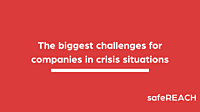The biggest challenges for companies in crisis situations

Organizations today are constantly exposed to risks ranging from natural disasters to cyber attacks and pandemic outbreaks. Each crisis brings with it specific challenges that can significantly impact management, employees and operations. This article highlights the biggest challenges that organizations face in crisis situations and discusses approaches to effectively manage them.
1.666 alarms per second
safeREACH as your powerful emergency notification system with up to 100.000 alarms per minute. Successfully used by multinational corporations, medium-sized companies and public authorities. ISO-certified server infrastructure.

1) Communication under pressure
One of the biggest challenges in a crisis situation is maintaining clear and effective communication. Information must be communicated quickly and accurately to everyone involved, from employees to stakeholders. Misinformation or delays can lead to confusion and exacerbate the situation. Companies must therefore have robust communication systems that function reliably even under extreme conditions.
safeREACH offers numerous possibilities in precisely this area. The alerting and crisis management tool offers a wide range of options for communicating under pressure. The tool also includes the alerting app, which is the direct line to all relevant people.
2) Fast decision-making
In times of crisis, company management must act quickly. The ability to make quick and well-founded decisions is crucial in order to be able to react effectively to unforeseen events. However, there is often a lack of time for detailed analyses, which increases the risk of wrong decisions. Companies must therefore establish mechanisms that support rapid decision-making under uncertainty, such as decision-making protocols and predefined emergency plans.
3) Safety and well-being of employees
The safety of employees is a top priority during a crisis. Companies face the challenge of protecting their employees while maintaining operations as much as possible. This requires comprehensive emergency preparedness plans that can include evacuation measures, remote working policies and psychological support.
Over 20 years of experience in alerting
IT alerting, fire alarms, alerting company first responders and much more. ISO-certified server infrastructure. Used by SMEs, corporations, authorities and public organisations.

4) Technological resilience
The dependence on technology has increased in many companies, making them vulnerable to technical failures and cyberattacks. A major challenge is to keep the IT infrastructure and critical data secure and operational even in times of crisis. Investment in redundant systems, regular backups and advanced cybersecurity measures are essential to ensure this resilience.
5) Maintaining the supply chain
Many companies are part of global supply chains that can easily be disrupted by crises. Securing the supply chain (keyword: supply chain continuity management) is crucial in order to avoid bottlenecks and business interruptions. Companies need to develop flexible supply chain strategies that allow them to adapt quickly to new circumstances, such as diversifying suppliers and increasing stock levels of critical goods. However, should a supply chain disruption occur, it is important to react quickly and find solutions to restore the chain.
6) Legal and regulatory compliance
Crisis situations can also pose legal and regulatory challenges. Companies must ensure that they comply with legal requirements even under exceptional circumstances, which can be made more difficult by rapidly changing regulatory requirements. Proactive legal advice and the monitoring of regulatory developments are essential here.
1.666 alarms per second
safeREACH as your powerful emergency notification system with up to 100.000 alarms per minute. Successfully used by multinational corporations, medium-sized companies and public authorities. ISO-certified server infrastructure.

Conclusion
Overcoming the biggest challenges in crisis situations requires a well-thought-out strategy that both strengthens the organization's resilience and increases flexibility to respond to dynamic situations. Investing in crisis communication technology, such as safeREACH's solutions, plays a critical role in empowering organizations to communicate effectively, respond quickly and ultimately protect their people and operations. Crisis preparedness is no longer an option, but a necessity for any modern organization.
